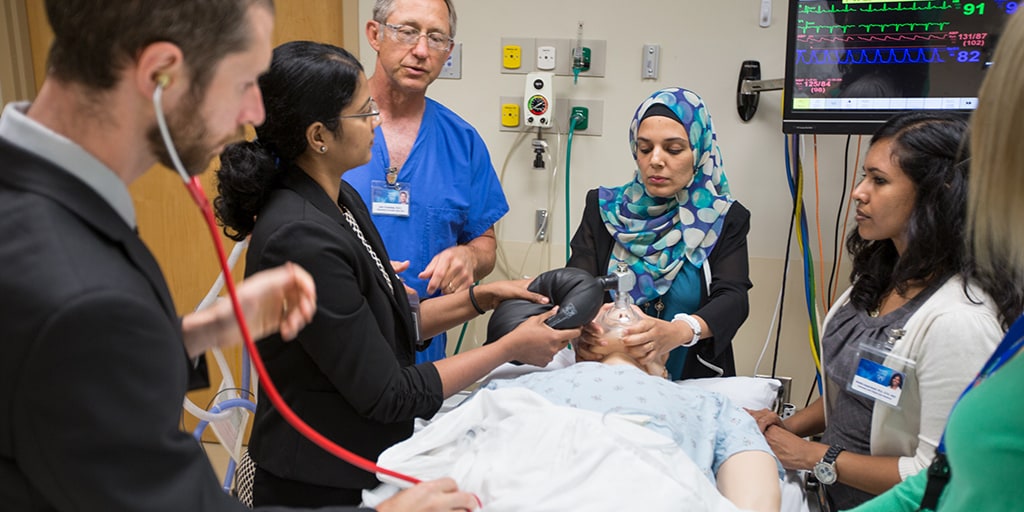Curriculum
/prod01/channel_2/media/mccms/content-assets/academics/residencies-and-fellowships/critical-care-internal-medicine-minnesota/curriculum/critical-care-3391583_0104-1024X512.jpg)
Clinical training
During clinical training in this fellowship, supervision by a Mayo Clinic consultant helps you obtain educational experience that results in graduated independence while ensuring the best quality of patient care delivery.
In the 2-year program, the first year includes six to nine months of critical care core rotations along with orientation, research, and elective rotations. The second-year schedule is based on your career development plan and mentor(s).
In the one-year program, schedule includes a minimum of six critical care core rotations along with orientation and elective rotations based on your career development plans.
Rotation schedule
This is a typical rotation schedule for a 2-year program (each block is approximately one month).
| Rotation | Length |
|---|---|
|
8-9 blocks |
|
4-5 blocks |
| Rotation | Length |
|---|---|
| *Non-ICU electives consist of nutrition, chest radiology, anesthesiology operation room, echocardiography, experiential education, transfusion medicine, peripherally inserted central catheter (PICC) line rotation, pulmonary consult service, sleep medicine, and pulmonary function laboratory. | |
|
4-6 blocks |
|
4-6 blocks |
Subspecialty ICU rotations include nephrology, infectious diseases, cardiology, cardiovascular surgery and ECMO, pediatric critical care, neurological and neurosurgical critical care, chronic ventilator dependency, lung and heart transplant rotation, and trauma.
Two weeks of outpatient bronchoscopy and two weeks of hospital pleural service blocks are offered to you during your fellowship.
An example of a possible rotation schedule for a one-year program:
Block Diagram
| Month 1 | Month 2 | Month 3 | Month 4 | Month 5 | Month 6 | Month 7 | Month 8 | Month 9 | Month 10 | Month 11 | Month 12 |
|---|---|---|---|---|---|---|---|---|---|---|---|
| Orientation | ICU | Elective | ICU | Research | ICU | Elective ICU | ICU | Research | ICU | Elective ICU | ICU |
Call frequency
Your call schedule may change for each rotation. Mayo Clinic College of Medicine and Science follows the recommendations of the Accreditation Council for Graduate Medical Education (ACGME).
Research and quality training
You have the opportunity to participate in at least one clinical or laboratory research project during the fellowship. You are expected to complete a research project for which dedicated time is allocated. During the first fellowship year, you complete a quality-improvement project and receive an academic certificate of recognition.
Didactic training
Didactic training is an integral part of the Critical Care Medicine Fellowship. You attend a variety of teaching sessions, conferences, and lectures. Training includes experiential learning within the Procedural Skills Laboratory and the Multidisciplinary Simulation Center at Mayo Clinic. You are also exposed to other innovative ways of delivering education such as the use of social media platform, video blogs, and flipped classroom models.

Teaching opportunities
Opportunities are available for teaching rotating residents and medical students. Also, you are given the opportunity to participate in educational workshops to improve your teaching skills.
Evaluation
To ensure that you acquire adequate knowledge and develop the appropriate technical skills to meet program expectations, your performance is monitored carefully during the Critical Care Medicine Fellowship. You are formally evaluated by supervising faculty members on a regular basis and meet with the program director to review these evaluations. In addition, you regularly evaluate the faculty to confirm that your educational needs are being met.